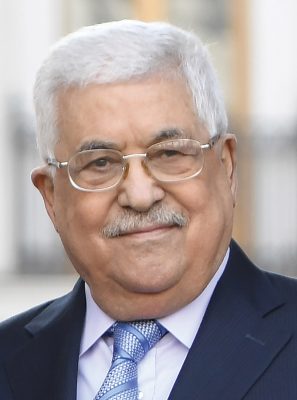×


We have detected your country as:
Please click here to go to the USA website or select another country from the dropdown list.
by: Ilse Strauss, Assistant Editor
 Last May, the Palestinian Authority (PA) president was rushed to the hospital for the second time in 24 hours. Suffering from pneumonia and on the brink of what Ynetnews called a “complete systems failure,” 83-year-old Mahmoud Abbas’s doctors feared for his life. Their concerns went beyond his well-being. Had Abbas died, millions of Palestinians would have been left leaderless—and perhaps more troubling, without a successor or a succession plan. Israel—concerned that his passing would spark bloody succession wars with Palestinian presidential hopefuls jockeying for the vacant position—promptly dispatched a specialist to join the bevy of foreign experts working to stabilize the ailing Abbas. Their efforts bore fruit. The PA president was discharged a week later.
Last May, the Palestinian Authority (PA) president was rushed to the hospital for the second time in 24 hours. Suffering from pneumonia and on the brink of what Ynetnews called a “complete systems failure,” 83-year-old Mahmoud Abbas’s doctors feared for his life. Their concerns went beyond his well-being. Had Abbas died, millions of Palestinians would have been left leaderless—and perhaps more troubling, without a successor or a succession plan. Israel—concerned that his passing would spark bloody succession wars with Palestinian presidential hopefuls jockeying for the vacant position—promptly dispatched a specialist to join the bevy of foreign experts working to stabilize the ailing Abbas. Their efforts bore fruit. The PA president was discharged a week later.
The May 2018 incident was but one in a list of health issues. Abbas underwent an emergency heart procedure in 2016, denied rumors of a stroke, had stents implanted and suffers from arterial plaque, the Times of Israel reports. Last February he struggled for breath during an important address, underwent a mysterious battery of tests and canceled an official trip, citing fatigue. A month later a cardiologist moved into the presidential compound to monitor his heart health. And last August, Palestinian sources claimed Abbas’s health had deteriorated to such an extent that it affects his memory and working ability.
The one person wholly unconcerned about Abbas’s deteriorating health is Abbas. “He believes he’ll live another 10 years,” explains senior political and Middle East analyst and strategic consultant Yoni Ben Menachem. “He tells his aides: ‘I have good genes. Everyone in my family lives past 90. I’m only 83.’”
Granted, the PA president is back to rubbing shoulders with world leaders, preening on red carpets and jetting to appointments in his US $50 million private plane. Abbas’s good genes may well allow him to live—and rule—another decade. Yet what if it doesn’t? What if the man who rules 2.5 million Palestinians without a chosen successor or a succession plan passes away suddenly?
The Rise of a Dictator
The scepter of leadership passed to Abbas because there was no succession plan. As Yasser Arafat, then president of the PA (the Palestinian self-governing entity instituted by the Oslo Accords and the official “government” of the Palestinians) and leader of Fatah (the leading Palestinian political party and largest faction of the PA), lay on his deathbed, Fatah leaders scurried to secure his blessing on an heir apparent. “Abbas was the senior leader after Arafat,” Ben Menachem says. “But Arafat didn’t like Abbas.” With death looming, Arafat was out of time—and choices. “Twenty hours before he died, Abbas walked into the hospital room and Arafat gave his blessing.”
Two months later the Palestinian people went to the polls to pick a president, electing Abbas to serve a four-year term. His absolute grip on power was short-lived. A year later the Palestinians went to the polls again—this time to elect a parliament. Instead of voting for Abbas’s political party—Fatah—the bulk of the votes went to the Hamas terror organization. “Fatah became so corrupted, the people were fed up and decided to give Hamas a try,” explains Ben Menachem. Abbas dug in his heels. As president, he refused to partner with the Hamas-majority parliament in ruling the Palestinians. Hamas promptly orchestrated a coup and seized control of Gaza, murdering various Fatah officials and driving the rest from the strip. The survivors fled to the Fatah stronghold in Judea and Samaria, where Abbas continues to govern 2.5 million Palestinians, while Hamas retains its grip on the 2 million Palestinians in Gaza. The result? No Palestinian elections since 1996, a government corrupt to the core and an aging dictator serving the 14th year of a four-year term.
Under Abbas’s Thumb
 “We’re talking about a dictatorship, not a democracy. Abu Mazen [Abbas’s Arab epithet] is no different from any other Arab dictator,” clarifies Ben Menachem. “He cares for nothing except staying in power.”
“We’re talking about a dictatorship, not a democracy. Abu Mazen [Abbas’s Arab epithet] is no different from any other Arab dictator,” clarifies Ben Menachem. “He cares for nothing except staying in power.”
The PA president’s refusal to tap an heir apparent stems from a two-pronged fear, continues Ben Menachem. Abbas misused his 14-year rule to enable his two sons to build a multi-billion dollar economic empire. “To the Palestinians, his sons are the symbol of corruption. The first thing the people will do when Abu Mazen is gone is to go after his sons, prosecute them and take back the money they stole.” Abbas, aware of the situation, will do what it takes to secure his family’s safety. Both his sons reside in Qatar. Should they be in Ramallah when he dies, they can flee in minutes.
The situation has, however, made it impossible to secure a successor. According to Ben Menachem, Abbas had his sights set on someone, but made the appointment dependent on a guarantee that his sons would remain untouched when he died. The Fatah leaders balked, stating that anybody giving such a pledge would die. “So Abbas doesn’t appoint anyone. When he feels his situation is bad, he’ll make sure his family is safe.”
Abbas’s fear is also personal. “He’s scared as soon as he picks someone, the successor will have no patience and won’t wait for him to die.” Instead, he opts to rule and divide, drawing someone into his inner sanctum for a few months, lavishing praise and attention, says Ben Menachem, only to turn the cold shoulder and move on to the next hopeful prospect.
A Perpetual Cycle of Oppression
The question remains: what happens if Abbas dies suddenly? With elections out of the question, Fatah will decide on the next interim president, Ben Menachem holds. “Yet in Palestinian politics, nothing is more permanent than an interim position—just look at Abu Mazen,” he adds. “We’re living in a jungle. In Fatah there are 12 people who see themselves as Abu Mazen’s potential successor. Take the list of prospects and see who’s the strongest with the most fire power, money and support from the people. That’ll be the one. These are the rules of the game. I believe there’ll be three or four nominees. They will either have to fight with each other—which means civil war—or come to an agreement to share power.”
In the end, concedes Ben Menachem, regardless of who takes the scepter of power from Abbas, the pattern of Palestinian governance will remain unchanged: no democratic elections, a government corrupt to the core, dictators settling into interim positions for the long haul and an oppressed society devoid of human rights.
Perhaps veteran Palestinian journalist Khaled Abu Toameh said it best: “Venal leadership has always been the main tragedy of the Palestinians.”
All logos and trademarks in this site are property of their respective owner. All other materials are property of Bridges for Peace. Copyright © 2024.
Website Site Design by J-Town Internet Services Ltd. - Based in Jerusalem and Serving the World.